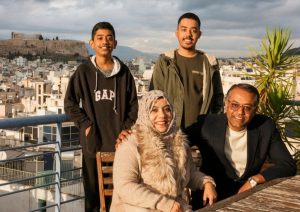Global support for refugees holding up
Global public support for refugees’ rights to seek safety continues remains strong despite the rise of nationalist regimes, geopolitical fragilities and significant cuts in humanitarian aid, according to a new survey.
The survey, by global pollster Ipsos, also found that, across 29 countries, a majority of people believe that wealthier countries should shoulder more responsibility for supporting refugees.
The survey found a strong majority (67 per cent) continues to support offering refuge to those fleeing war or persecution.
Countries like Sweden, Argentina, and the Netherlands show particularly strong support.
A majority (62 per cent) believe wealthier nations have a moral obligation to provide financial assistance to refugees.
“The public would most like to see increased financial contributions from international organisations (e.g. UN and World Bank) (39 per cent) – just as aid to the UN is being drastically reduced – and governments of other wealthier nations (30 per cent),” the survey report said.
 Citizens in some nations, like the US, Ireland, Sweden, the Netherlands, and Australia, show a desire for their governments to do more.
Citizens in some nations, like the US, Ireland, Sweden, the Netherlands, and Australia, show a desire for their governments to do more.
But while compassion remains relatively high, active support through activities such as donations or social media engagement has decreased from 38 per cent in 2024 to 29 per cent this year, the survey found.
“This decline may be attributed to shifting public priorities, particularly economic concerns,” the report said.
But a significant percentage (62 per cent) of people surveyed believe that many asylum seekers are primarily economic migrants, leading to anxieties about border security.
“This perception fuels concerns about refugees’ ability to integrate and contribute positively to society,” the report said.
The UN refugee agency UNHCR, which commissioned the survey, said the overall picture was complex, impacted by deep aid cuts and increased scapegoating of refugees by some politicians and on social media.
“The survey revealed that overall scepticism persists regarding the motivations behind refugees’ journeys in many countries – with 62 per cent believing asylum-seekers are primarily seeking economic opportunities rather than fleeing danger,” the report said.
“This view fuels concerns about border security and welfare, leading 49 per cent of respondents to express support for closing their country’s borders to refugees entirely. Despite this prevailing scepticism, a considerable proportion (40 per cent) continues to acknowledge the positive contributions refugees make to their new homes, with the US among the most supportive at 56 per cent.
“The results indicated less personal engagement in activities to support refugees, with fewer donating or volunteering; personal action to support fell to 29 per cent from 38 per cent, potentially reflecting compassion fatigue and financial constraints.
“Still, a majority (62 per cent) believe wealthier nations have a moral responsibility to financially support refugees. Indonesia, South Korea and Türkiye, in particular, want more involvement from international organisations – just as aid to the UN is being drastically reduced,” the report said.
The UNHCR’s Director of External Relations Dominque Hyde said: “The public still believes in the right to seek safety and wants wealthy nations to do more, but the economic backdrop and global political climate are eroding individual support. Needs are more acute than ever. The humanitarian system will wither without a unified effort from governments, organisations, the private sector and the public to build solutions and hope for those forced to flee.”
The survey canvased a thousand people in each of Australia, Belgium, Brazil, Canada, France, Germany, Great Britain, Indonesia, Italy, Japan, Spain, and the US, as well as 500 people in each of Argentina, Chile, Colombia, Hungary, Ireland, Malaysia, Mexico, the Netherlands, Peru, Poland, Singapore, South Africa, South Korea, Sweden, Thailand, and Türkiye. In India, 2200 people were interviewed.
Read the full survey: Public Support Holding Steady for Refugees Despite Global Fragility | Ipsos












